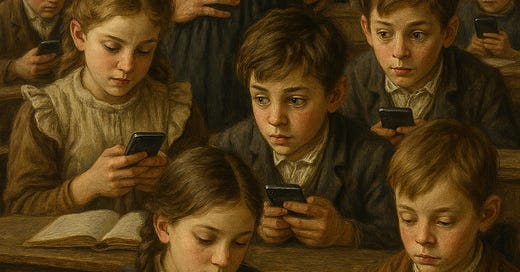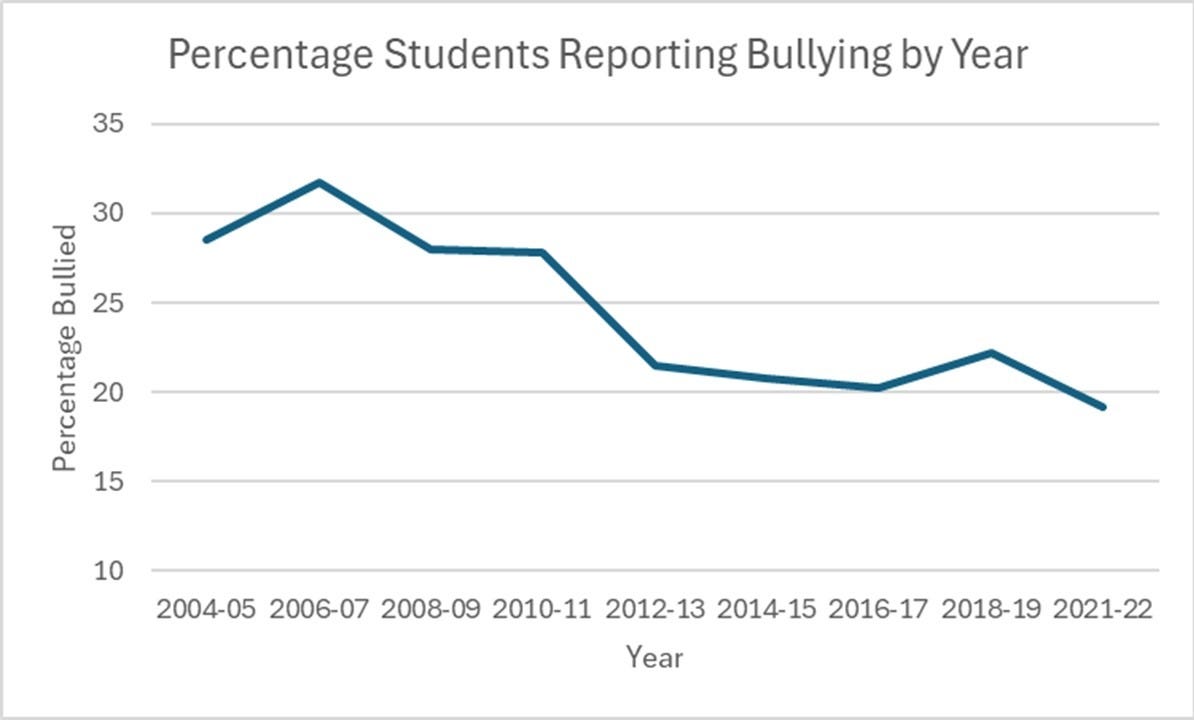What Do Kids, Parents and Teachers Really Think About School Cellphone Bans?
Data from one UK school suggest it's more nuanced than some have claimed.
Recent years have seen an explosion of cellphone ban policies in schools. They’ve become increasingly popular despite current (if partial) evidence suggesting they do not work. In a recent report I did for Real Clear Investigations I found that, anecdotally at least, some schools publicly claimed rosy outcomes for their policies, despite data from their own schools suggesting worsening outcomes for bullying, mental health, and little movement on grades after implementing cellphone bans. Further, bans seemed to cause an uptick in suspensions, an outcome well-known to harm kids.
My impression is that schools are basically throwing policies in place with little evidence to support them, and making very little effort into seriously assessing whether they are helpful. Thus, one school in the UK, the Backwell School, deserves significant credit for doing some actual assessment of their cellphone ban policy. They’ve released a new report on what they’ve found.
To be clear, this is not an outcome study per se. There’s no pre/post data and, of course, no control group. It’s a basic attitude survey of students, parents and teachers. Still, given that some crusaders are claiming wide support for cellphone bans, it’s interesting to get a look at what people really think. Predictably, the outcomes are more mixed than news reports might have us believe. Granted, this is only one school in the UK, but I think this is still pretty interesting. A few takeaways:
Teachers Question How Effective the Policy Is.
Only about 27% of teachers rated the policy as “effective” in improving student engagement and learning (roughly 36% rated it partially effective). I guess this is…ok? But not exactly the ringing endorsement we’ve been hearing from some sources. Keep in mind these are teachers’ beliefs, not actual evidence for effectiveness, and given I’d expect teachers to be biased in support of the policies I was a bit surprised by this lukewarm reaction.
Students Try to Sneak Past the Policy.
Not surprisingly, many students try to circumvent the ban in various ways. The report says 55% of students follow the school policy “always” but in the next slide it appears that upwards of 85% of students sneak looks at their phones in various ways mostly by doing things like keeping it under the table on silent mode or looking at it while on a toilet break. As typical: tell kids they can’t have something, it becomes a challenge for them. Maybe this is good in the sense of teaching resilience when faced with dumb policies?
Students are Skeptical of Cellphone Bans.
Some news reports seem to get quotes from students who just love cellphone bans. My guess is most of these quotes come from the hall-monitor set of kids1…yes, the very same kids who grow up to become journalists at big outlets2 and social scientists3. In this study, most kids supported the idea they should be able to use phones when outside of class. Most did seem to accept they shouldn’t be used during class, despite most kids seemed to be doing exactly this on the sly. Parents were more split, with the most popular option being for the phones being off but in the student’s bag. Teachers were most accepting of more restrictive policies.
Parents Tend to Overestimate Students’ Harmful Experiences with Phones.
Only a minority of students endorsed most negative experiences on phones (for negative mental health, it was about 18%, for instance, pretty consistent with other surveys of youth including the somewhat misrepresented “Facebook Files”). There were some exceptions…parents tended to underestimate how often youth saw problematic content on social media. But there were definite discrepancies between parents’ concerns and youth experiences. Again, these questions are about what people think is happening not what actually is happening.
Teachers Definitely Don’t Like Phones
Teachers definitely rated phones a “net negative” for schools. This doesn’t surprise me, both because teachers tend to be old technophobes, but also because phones serve as a visible reminder of how boring so many teachers are. A more visible reminder than doodling, daydreaming or perhaps even sleeping in class (though that probably comes closer).
The reliability of teachers’ observations are somewhat dubious, however. Over 50% of teachers report witnessing bullying behaviors (it wasn’t clear from the presentation whether this was supposed to be related to cellphones). However, at least in the US, according to National Center for Education Statistics, bullying has declined significantly, even when cyberbullying is included for students during the social media/smartphone age. So, again, this is what teachers think they see not what actually is happening.
Family Conflict is a Common Negative Experience
About 35% of students and nearly 48% of parents report family conflicts occurring on cellphones. This is kind of a propos of nothing, but this seems an interesting datapoint I’d love to see people dig into more, given family conflict tends to be a far, far, far bigger predictor of youth mental health than anything involving technology.
Struggling Students Both Had More Negative Experiences and Were More Skeptical of Bans
It’s probably not a surprise that students rated as struggling also reported experiencing more negative experiences involving smartphones. It may simply be that smartphones are one (but not the only, nor essential) vector for other problems happening in their lives (see family conflict above). But these students were also MORE skeptical of any school bans on cellphones. I always do wonder with these things, how much of these policies are really about protecting kids as opposed to preserving adults various vanities or simply turning the screws on teens and their “lowbrow” culture.
These are just a few of the things that stood out for me. Be sure to read the full report as there’s more in there. I think it’s important to note that, reasonably speaking, Backwell School had every motive to be defensive about their cellphone policy. It looks like they are really trying to understand whether this policy is effective or supported by the community. I wish more schools would follow their lead.
Yes, the kid of kids who are more likely to enjoy rules, regulations and even censorship. And view themselves with moral superiority.
NYT, Atlantic, Wall Street Journal, etc., I’m looking at you…
Far from being man-the-barricades rebels, most scholars are conformists, from my experience.





